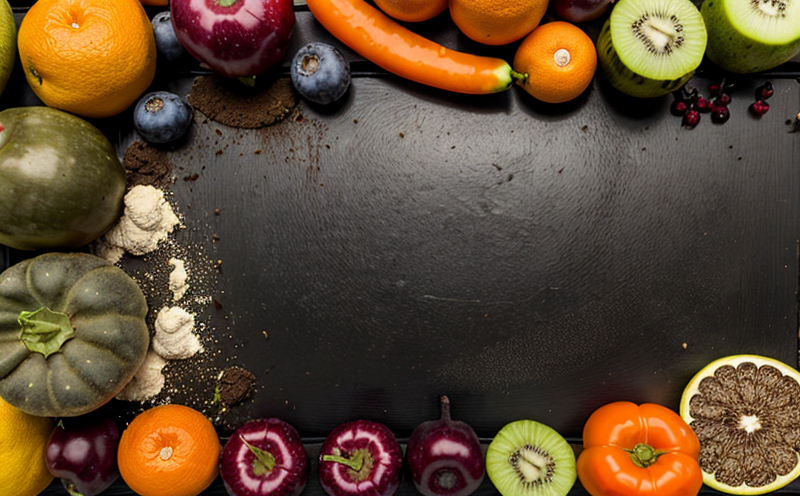Codex CAC/GL 75 Multi-Residue Testing in Vegetables
The Codex Alimentarius Commission (CAC) is an intergovernmental body with a mandate to develop codes of practice, guidelines and standards for foods. The CAC/GL 75 guideline focuses on the multi-residue testing of pesticides in various food items, including vegetables. This service ensures that your produce complies with international safety standards by detecting trace amounts of pesticide residues.
The process involves sampling, extraction, purification, and analysis using advanced analytical techniques such as Liquid Chromatography-Mass Spectrometry (LC-MS/MS). LC-MS/MS provides high sensitivity and selectivity, making it suitable for the detection of multiple pesticides simultaneously. This approach helps to ensure that your products meet the stringent standards set forth by CAC/GL 75.
During specimen preparation, vegetables are carefully selected based on their type, size, and condition. They undergo thorough cleaning processes before being ground into a fine powder. Extraction solvents like methanol or acetonitrile are used to extract pesticides from the samples. Once extraction is complete, the extracts go through purification steps to remove interfering compounds.
The purified extracts then enter the LC-MS/MS system for analysis. The instrument separates individual components based on their mass-to-charge ratio and retention time. Analysts identify residues using reference standards provided by reputable organizations like the United States Environmental Protection Agency (EPA) or European Union Reference Laboratory for Pesticides (EUR-LAB).
Results are reported according to CAC/GL 75 guidelines, specifying which pesticides were detected along with their concentrations. Compliance with these limits is crucial for maintaining product safety and consumer confidence.
This service plays a vital role in protecting public health by ensuring that the vegetables entering markets comply with international regulations regarding pesticide residues. By adhering strictly to CAC/GL 75 requirements, you can rest assured knowing your produce meets global standards.
Why It Matters
The Codex CAC/GL 75 multi-residue testing is essential for several reasons:
- Consumer Safety: Ensures that pesticides do not exceed safe levels, protecting consumers from potential health risks.
- Market Access: Helps companies meet regulatory requirements necessary for exporting to different countries.
- Reputation Management: Demonstrates commitment to food safety and quality, enhancing brand reputation.
Pesticides are critical tools in agriculture but must be used responsibly. Proper testing ensures that they do not pose threats when consumed by humans or animals.
The standards set forth by CAC/GL 75 provide a uniform framework for countries to follow, promoting consistent practices across borders. This consistency fosters trust among trading partners and reduces discrepancies in enforcement between regions.
Industry Applications
| Pesticide Type | Sample Preparation | Analytical Method | Acceptance Criteria |
|---|---|---|---|
| Organophosphates | Solvent extraction followed by solid phase clean-up | Liquid Chromatography-Mass Spectrometry (LC-MS/MS) | Pesticide concentrations below the maximum residue limit (MRL) set forth in CAC/GL 75 |
| Arylamides | Solvent extraction followed by solid phase clean-up | Liquid Chromatography-Mass Spectrometry (LC-MS/MS) | Pesticide concentrations below the maximum residue limit (MRL) set forth in CAC/GL 75 |
| Pyrethroids | Solvent extraction followed by solid phase clean-up | Liquid Chromatography-Mass Spectrometry (LC-MS/MS) | Pesticide concentrations below the maximum residue limit (MRL) set forth in CAC/GL 75 |
| Carbamates | Solvent extraction followed by solid phase clean-up | Liquid Chromatography-Mass Spectrometry (LC-MS/MS) | Pesticide concentrations below the maximum residue limit (MRL) set forth in CAC/GL 75 |
| Heterocyclic Compounds | Solvent extraction followed by solid phase clean-up | Liquid Chromatography-Mass Spectrometry (LC-MS/MS) | Pesticide concentrations below the maximum residue limit (MRL) set forth in CAC/GL 75 |
These applications highlight how CAC/GL 75 multi-residue testing ensures that vegetables are safe for consumption while maintaining high quality standards.
Eurolab Advantages
At Eurolab, we offer comprehensive Codex CAC/GL 75 multi-residue testing services tailored specifically to your needs:
- Comprehensive Analysis: Our laboratories perform over 100 different pesticide analyses on vegetables.
- State-of-the-Art Facilities: Equipped with cutting-edge LC-MS/MS equipment for precise and reliable results.
- Experienced Analysts: Trained professionals who stay updated with the latest methodologies and international standards.
- Fast Turnaround Times: Get your results quickly so you can make informed decisions promptly.
- Custom Solutions: Tailored testing programs designed to meet specific project requirements efficiently.
We pride ourselves on delivering accurate, reliable data that helps ensure the safety and quality of your products. With Eurolab by your side, you can confidently comply with international standards.





